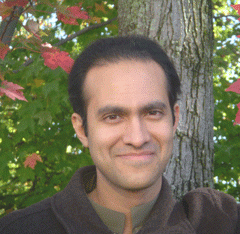Professor Saleem Ali is the Director of the Centre for Social Responsibility in Mining (CSRM) and also Affiliate Professor of Politics and International Studies at UQ where he is part of the Rotary International Centre for Studies in Peace and Conflict. He retains an Adjunct Professorship in Environmental Studies at the University of Vermont's Rubenstein School of Natural Resources, where he was the founding director of the Institute for Environmental Diplomacy and Security.
His training and teaching at CSRM include modules on mineral economic history and conflict resolution for the Anglo American Advanced Social Management Program held in South Africa and Chile (in partnership with the University of Cambridge, UK).
Prior to accepting the position at CSRM, Prof. Ali was a Professor of Environmental Studies at the University of Vermont's Rubenstein School of Environment and Natural Resources and the Director of the Institute for Environmental Diplomacy and Security at UVM's James Jeffords Center for Policy Research. He was also on the adjunct faculty of Brown University’s Watson Institute for International Studies and the visiting faculty for the United Nations mandated University for Peace (Costa Rica).
Before embarking on an academic career, Prof. Ali worked as an environmental health and safety professional at General Electric (based at GE headquarters in Fairfield, CT, and at silicone resin manufacturing sites in New York). He has served as a consultant for the U.S. Environmental Protection Agency, U.S. Fish and Wildlife Service and Health Canada. He has also been an Associate at the Boston-based consulting firm Industrial Economics Inc. Some of his pro bono projects include a mining impact prospectus for the Crowe Tribe of Montana and research assistance to Cultural Survival (an indigenous rights NGO).
Prof. Ali's primary research interests have been in the causes and consequences of environmental conflicts in the research sector, and the process of using ecological factors to promote peace. Some of Prof. Ali’s former research appointments include a visiting fellowship at the Brookings Institution's research center in Doha, Qatar; a Public Policy Fellowship at Griffith University in Brisbane, Australia, a Baker Foundation Research Fellowship at Harvard Business School and a parliamentary internship at the U.K. House of Commons. Dr Ali has teaching experience in courses on environmental planning, conflict resolution, industrial ecology, research methods and technical writing.
His most recent book is Environmental Diplomacy: Negotiating more Effective Global Agreements (with MIT's Larry Susskind, Oxford University Press, 2015). He has authored 3 other peer-reviewed books, edited 4 anthologies and over 80 peer-reviewed journal articles. Professor Ali is also a frequent contributor to popular media publications including The Conversation, The Huffington Post, Scientific American, National Geographic online, Foreign Policy and the Carengie Council's Policy Innovations blog. He is also a series editor for the University of Chicago Press Summits Series on Environmental Science Law and Policy.
Prof. Ali’s book Treasures of the Earth: Need, Greed and a Sustainable Future (Yale University Press, 2010) was selected by Scientific American as one of the best books of 2010 and had cover endorsements from two Nobel laureates. Among his earlier works is the acclaimed comparative case-based research book Mining, the Environment and Indigenous Development Conflicts (University of Arizona Press). Prof. Ali has served as an editor in many publications including Earth Matters: Indigenous Peoples, The Extractive Industries and Corporate Social Responsibility (edited with Ciaran O'Fairchellaegh) and the widely acclaimed volume Peace Parks: Conservation and Conflict Resolution (MIT Press, September, 2007), which has received cover endorsements from environmental scientists E.O. Wilson, George Schaller and UNEP executive director Achim Steiner, and a foreword by IUCN Director General Julia Marton-Lefevre.




